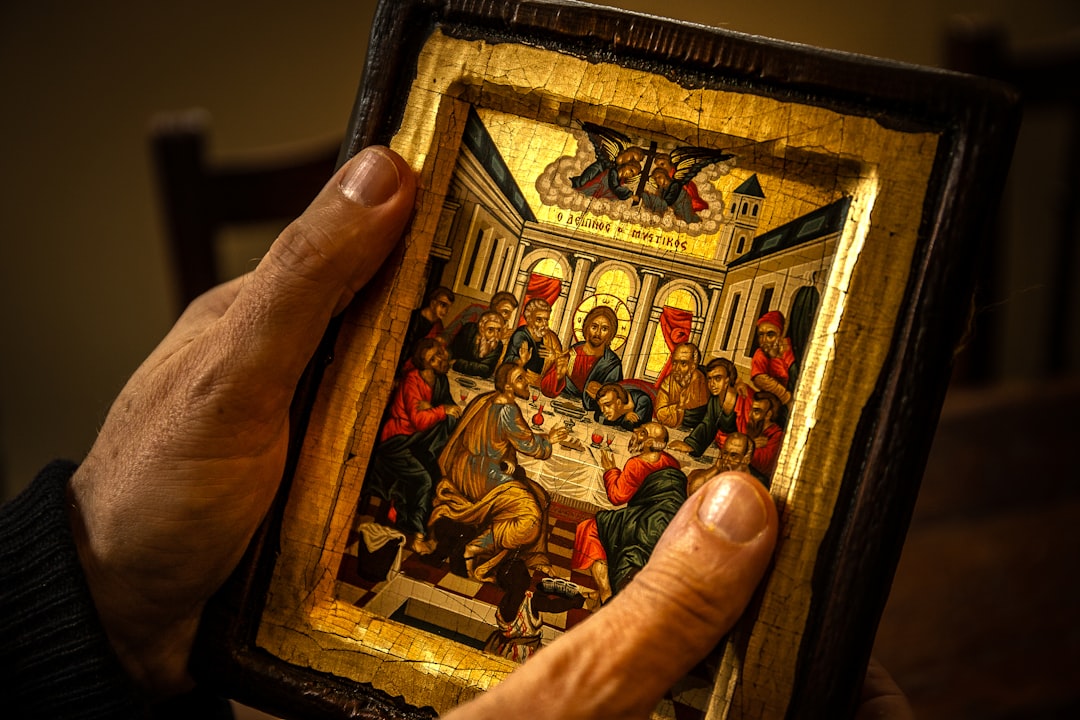Dorothy Day was a Catholic social activist. A Cardinal once described her as trying "to live in such a way that one's life would not make sense if God did not exist."
This is a beautiful description that should apply to every Christian’s life!
(Shouldn’t it?)
After all, as Saint Paul wrote, the Gospel is something that doesn’t quite make sense in light of the wisdom of our time: "We proclaim Christ crucified, a stumbling block to Jews and foolishness to Gentiles." (1 Corinthians 1:23)
And this “foolishness” makes perfect sense to Christians because we are not shaped by the folly of the world. Rather than think as the world thinks, “we have the Mind of Christ.” (1 Corinthians 2:16)
But do we really have this Mind?
Do our lives only make sense in light of the crucified Christ?
Or do our lives makes perfect sense without God?
Asked another way, are we Orthodox Christians shaping the world…or being shaped by the world?

I’ve spent my entire life involved in the ministries of the Church, both as a participant and a leader (I started teaching Sunday School when I was in high school, for example).
And, based on those decades of experience, I’d argue that the ministries of the Church often make perfect sense without God: that they’re shaping people according to the foolishness of the world rather than the Mind of Christ.
That’s a bold statement, I know. So let’s get into it…
The Shape of Orthodox Christian Ministries
As the Director of Y2AM, I spent the last nine years trying to address a significant problem.
Because the way Orthodox Christians tend to approach youth and young adult ministry simply hasn’t been working…
Generations of young people have passed through a dizzying array of ministries: Sunday School, summer camp, youth group, you name it. By the time someone turns eighteen, he will have spent as many as fifteen years involved in various youth ministries.
And yet, we all know that the overwhelming majority of these young people are increasingly disaffected and disengaged from the life of the Church. They are increasingly of the opinion that their lives "make sense" without God.
They grow up, not into faithful Christians, but former Christians.
Of course, it’s easy to blame the culture for this phenomenon…
But what if we Orthodox Christians have internalized a flat, “secular” worldview? What if we have designed our ministries and communities to make sense without God?
What if, after a lifetime spent in a variety of ministries, young people are simply far more at home outside of the Church than inside the Church?
Because that’s exactly what we’ve taught them to seek!
Now, this can be a particularly hard pill for Orthodox Christians to swallow…
After all, we believe the same dogmas we’ve always believed. We still read the same works of theology we’ve always read.
I mean, if anyone can claim to be immune from the influence of contemporary culture, surely it’s the members of the venerable and ancient Church.
Surely it’s us Orthodox Christians!
(Right?)
One Young Adult’s Story
I’ve given talks to thousands of young adults across the country, and have been blessed to speak face-to-face with hundreds of them. When young adults share their stories, I’ve noticed a common thread.
And that thread was incredibly obvious when I met Catherine at a young adult event.
We were going around the room, sharing our stories and struggles. And, as Catherine spoke, everyone in the room began nodding in silent agreement.
Because her story, while stark, is far from unique…
Catherine described growing up in the Church. She was active in everything: from Sunday School to the parish dance group. She played on the basketball team and never missed a youth event.
Yet, as soon as she graduated high school, her relationship with the Church dissolved overnight…
Catherine spent the next few years popping in and out of different clubs and groups. And that’s why our paths crossed: as soon as she heard that there was an Orthodox young adult event in the area, she made sure to attend.
Because, as she described her journey, one thing was clear: Catherine was desperate to belong to something.
She grew up belonging to groups. And, having heard a new young adult group was meeting, she was eager to join.
But you know what she wasn’t looking for? A relationship with Christ. A place in His Church.
She’d never experienced any of that in her life, so it wasn’t something she knew to look for.
Instead, Catherine had internalized an institutional group identify. A lifetime of ministry hadn’t prepared her for anything deeper.
Even after spending most of her deeply embedded in the ministries of the Church, she never felt like she knew Christ or belonged to His Church…
But why?
"Institutionalized" by Ministry
How can someone who was active in literally every program the Church offered feel so disconnected from the Church?
Well, there’s a scene in the movie The Shawshank Redemption that may help help us understand what’s going on…
The movie takes place in Shawshank State Prison. And Brooks Hatlen is an elderly inmate, someone who was locked up as a young man and spent his entire life behind bars.
Unexpectedly, Brooks learns that he’s been paroled at age 73, after over 40 years in prison.
You’d think that would be cause for celebration, right?
Yet Brooks isn’t pleased with the news. Instead, he holds a knife to another inmate’s throat and threatens to kill him.
One of Brooks’s friends is confused by this reaction: why isn’t Brooks happy to finally be a free man?
Another inmate soberly responds: Brooks has been institutionalized. He’s spent so long in prison that he no longer knows how to live as a free man. There is nothing connecting him with the wider world.
After all, what’s a prisoner without prison walls?
And what’s a youth group member without youth group?
The End of Ministry?
I’ve spoken to a lot of concerned grownups over the years: from priests to parents to parish council members. Whether or not they have children of their own, they tend to share an anxiety about the direction of ministry. And they tend to express that anxiety with a simple question:
How do we keep kids in the Church?
This question, simple though it may appear, assumes that the purpose or “end” of ministry is to do things like:
keep kids out of trouble;
help kids grow up to be Church participants and donors; and
ensure that kids keep identifying as Orthodox Christians.
Of course, none of that is bad, necessarily. But something critical is missing…
Because what we call “ministry” is really just about behavior management or organizational development or brand awareness.
Is any of this particularly Christian, in the deepest sense of the word?
Is any of this really about knowing Christ?
This question hit me when I was preparing to give a talk at OCF’s annual College Conference. As I prepared to speak to over 300 college students, I wandered in the Antiochian Village museum and discovered this painting:
I was mesmerized.
Artist Niko Cochelli portrays the moment of Saint Ignatius’ martyrdom in vivid detail. As the first beast bites into the great saint, we can see both the pain and hope in his eyes.
As the life begins to bleed out of him Saint Ignatius looks into the distance, keeping his attention firmly rooted on Christ and the Life that only He can offer.
I had read Saint Ignatius’ words, but seeing Cochelli’s painting finally brought them to life:
Suffer me to become food for the wild beasts, through whose instrumentality it will be granted me to attain to God. I am the wheat of God, and let me be ground by the teeth of the wild beasts, that I may be found the pure bread of Christ.
(St Ignatius of Antioch, Letter to the Romans)
As I gazed upon the witness of this great saint and martyr, I wondered: what if I were to tell that roomful of college students that this is the end of ministry?
What if I were to tell their parents?
What if I were to say that the goal of Christian ministry is not to raise well-behaved, respectable parishioners who pay membership dues and affiliate with the correct religious club?
What if the end of ministry is to encounter Christ, embody His Church, and engage the world in His name?
What if the end of ministry is to know Christ? To love God with ones whole heart, soul, strength, and mind? To love ones neighbor as oneself?
No matter the cost…
If this strikes you as foolish, you’re not alone. When I was growing up, people wanted me to become a doctor or lawyer, someone successful who lived a comfortable life.
Sunday School would help make sure I was a good boy. Youth group would help me learn to be a productive member of the community. Young adult group would help me meet a nice girl with whom I could have nice, well-behaved babies and start the cycle all over again.
That all makes perfect sense without God, doesn’t it?
Whatever mind we’ve developed as a body of believers, it doesn’t seem to be the Mind of Christ.







If this comment causes too much friction I'll delete it if you don't do it first. I have been observing some things lately in my own parish and am trying to wrap my brain around the problem and see if anything can be done. I'm a convert, and I've been orthodox about 5 years now. My family joined the church because we really needed Jesus, and He led a priest and his wife to reach out a hand to us. That said, I understand that I have no authority to stand on in making this comment but I'm going to do it anyway.
What I've observed, both in seeing new people flood into the Church recently AND in my own journey to being a member of the church (which I never was growing up, by the way, not in ANY church), is that any attempts at piety are laughed at, scorned, and called "convertitis" by the initiated, by those who grew up in the church, or those converted so long ago that they may as well be cradle Orthodox. I've even heard it from clergy. Oh, she's wearing a long skirt and headscarf? How culty! Must be one of THOSE people. Why can't she just be like the rest of us? Fasting? Evening prayers? Who actually does that? That's cute, give it a few years and we'll see. Or, God forbid, you kindly ask someone to stop talking during the readings of the scripture, your convertitis is showing.
I've seen grown adults who have been Orthodox their entire lives actively distracting infant and toddler children who were being perfectly quiet before from the reading of the Gospel by talking to them! Those are formative experiences that are going to shape the way that child interacts with the church, and what you're teaching them right now is that they are more important than the very Gospel, the proclamation that Christ Jesus has defeated death! So if that's the case, of course they're going to think it's unimportant. They're going to think church is a social club, that it's all about them - and once they get older, they're going to find a better social club with less rules. Especially if you subscribe to the "prayer and fasting is for converts" and effectively divide your life between "Christianity for a few hours most Sundays" and "The real world" which is driven by secular desire for wealth, power and pleasure.
There's a serious disconnect somewhere that's causing this. My reason for wanting to be in church and to hear the Gospel and attend weekday service has nothing to do with Rad-Trad behavior - in fact, I find that particular subculture quite irritating but try not to judge - and has everything to do with remembering life before the church. My whole family, including my teenage daughter, remembers very clearly how a house blessing and nightly prayer changed our lives, saved us from despair, and we don't want to go back to that. But we also don't appreciate being treated like we're taking the Faith "too seriously." Yes, my family attends most of the services our parish offers, we try to keep the fasts, and yes, my daughter and I wear head scarves and long skirts in church. Why? Because the priest who drove 3½ hours to bless the home of some semi-pagan miscreants told us that, if we wanted to try to keep faith, we should pray every morning and every night, attend church as much as possible, and that ladies (and men, frankly) were expected to dress a certain way in a house of prayer as part of an effort to reorient oneself toward prayer and worship. And this priest was Russian, so yes, headscarves. So, we listened to him.
All of this is to say that if youth ministry isn't focused on educating young people about our beautiful theology, the reasons we do what we do, WHY we're expected to behave and dress certain ways, and does not encourage prayer, fasting, and mindfulness, and doesn't focus on all of the absolute treasure we inherit from our faith, in terms they can understand - of course they're going to leave the church. We've given them no reason to stay, and certainly haven't directed them to Christ. We can't align our lives with the secular garbage being tossed at us in every direction and expect children to see any value in attending church. We really have to try to live as Christians outside of 2 hours on Sunday and really talk to our kids about God. We have to lovingly and kindly have expectations of them, and we have to lovingly and kindly help them live up to those expectations, and help them up when they fall, just like the rest of us. We can't let the world dictate our schedules and our motives and then cry that our kids are rebelling against the church as soon as we let them out of our sight. We can't sit there talking to them during the Gospel reading of they're sitting there quietly engaging with it the way only children do. We also can't expect them to be perfect little youth club robots. We have to somehow get past our own sinfulness and failure, and bring them to God.
May God help us all.
This all makes so much sense. I want to suggest however an over-emphasis on the institutionalization of young people as the core problem. And this is simply because all the programs you talk about that Catherine participated in - that mountain of ministry stuff - is not present in many many parishes. Bigger parishes have those things to offer, most small - medium sized parishes have some to none of that to offer. But the young people in those parishes are becoming disenchanted or disengaged just the same. I don’t believe the core of the problem can be categorized as institutionalization across the board because that isn’t the experience of many (I almost want to say most based on my own experience) young people. Those young people never felt a part of ANY group other than the community itself and are equally disconnected. However the solutions, as you suggest, lie below all that, at the point where we’ve failed to help them develop their true, real relationship with Christ and find their true, real place in the Body of Christ. That is where we’re missing the mark whether they’ve had the opportunity to participate in youth groups and learn from formal church school curricula or not.